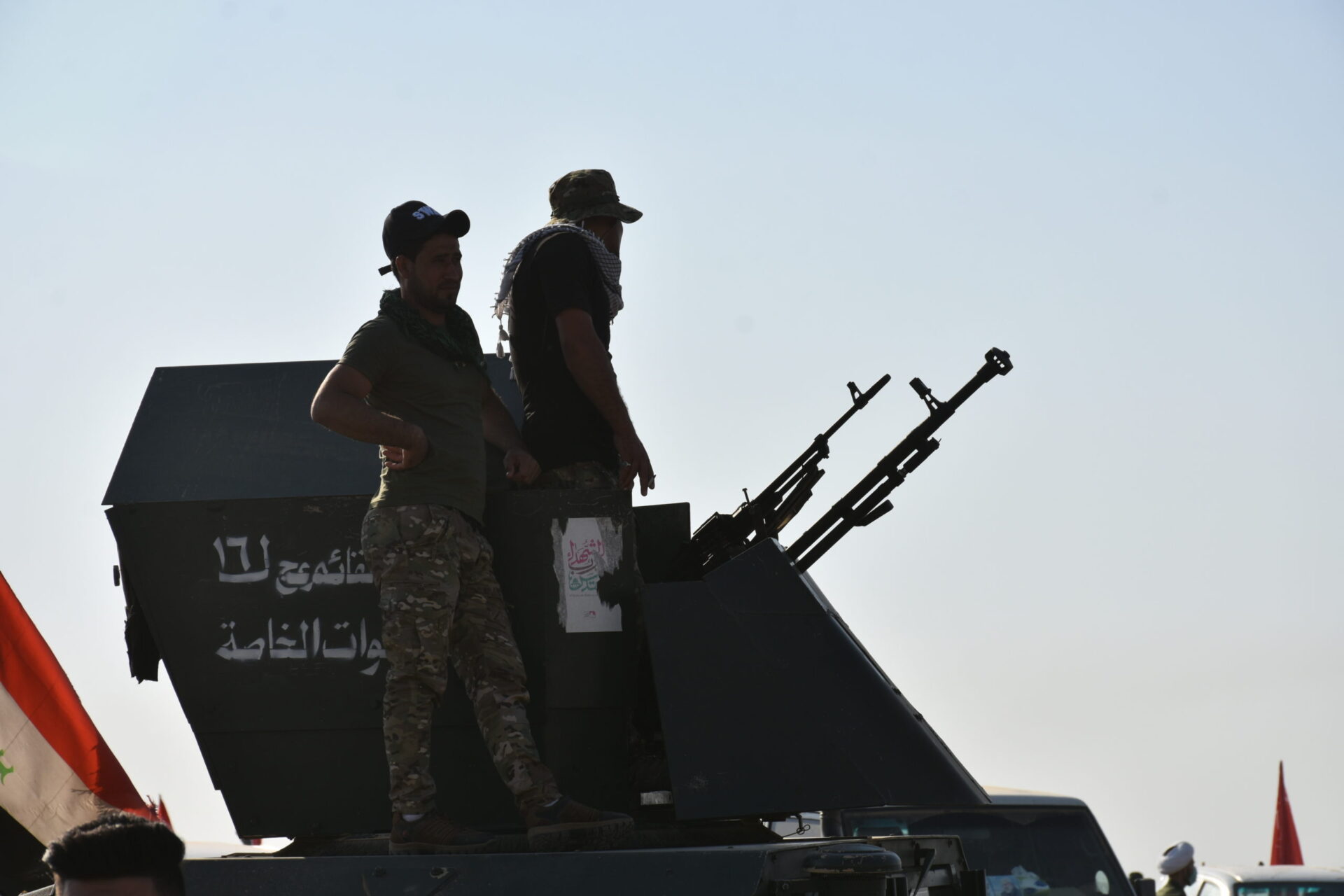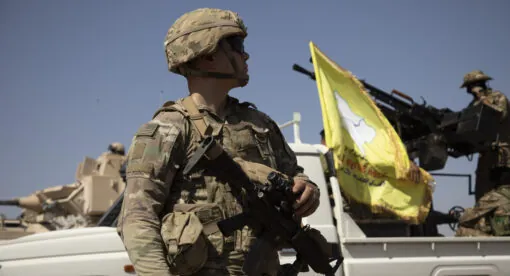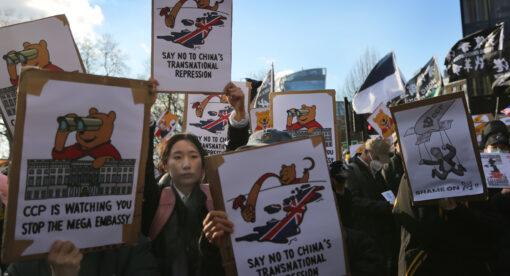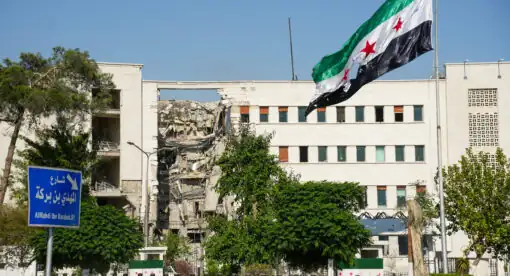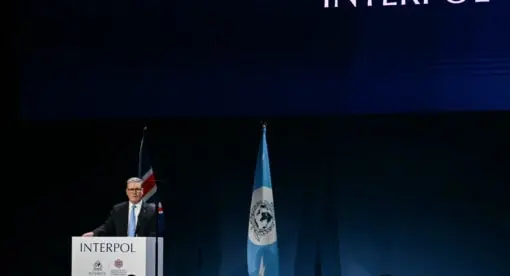On July 6, 2020, Dr. Husham al-Hashimi was killed by gunmen outside his home in the Iraqi capital Baghdad. He had submitted a series of articles to the Newlines Institute before his death, which we will continue to publish throughout the summer.
Editor’s Note: This Terrain Analysis is part 18 of “ISIS 2020” – a series of briefings about the current status of the Islamic State by authors from different parts of the region. It is published by the Newlines Institute‘s Nonstate Actors program. Parts one, two, three, four, five, six, seven, eight, nine, ten, eleven, twelve, thirteen, fourteen, fifteen, sixteen, and seventeen have been released weekly since April 28.
A money-and-death triangle is emerging in the area to the north and east of the Iraqi capital, Baghdad. Absent any monitoring, intelligence legwork, or other broader security and political economic interventions, this oil-rich area stands to become a hotbed of terrorist operations and money harvesting and could see the return of activities that could again kick up dust storms of sectarianism.
This triangle is home to nearly 1,200 active members who survived the campaign to dismantle the ISIS caliphate. It is spread across over 17,000 square kilometers (6,500 square miles) of topography consisting of hills, mountains, valleys, and large swaths of desert and farmland, which accounts for something like 5% of Iraq’s surface area. Indeed, this could be a prelude to ISIS’s re-empowered underground camps, stockpiles, and investments, leading up to a full-blown comeback, particularly since the majority of ISIS field commanders and fighters operating in these territories are locals.

Terrorist Operations On The Rise
Between early March and early June, ISIS claims to have conducted 204 terrorist operations in this triangle – an average of 17 per week – with 47 operations officially logged in by Iraqi security. The operations have most frequently occurred in northeastern Diyala, southwestern Kirkuk and eastern Salah al-Din. Laid over the Iraqi map, these terrorist operations show a systematic effort toward achieving three goals:
- Cutting off inter-provincial roads and setting up further “death triangles” in areas with complex terrains.
- Nipping efforts toward inter-communal cooperation in the bud to prevent Iraqis from further uniting against ISIS, through the practice of sectarian, denominational, and political killings.
- Enforcing an economic blockade on the outskirts of cities and turning farmland and open land into command-and-control bases.
In the three oil-rich governorates of Diyala, Kirkuk, and Salah al-Din, which are also known for their cultural, ethnic, and religious diversity – cleavages that ISIS is adept at exploiting to its advantage – ISIS’s new leadership also sees a clear opportunity to capitalize on the economic, social, and political crises gripping those territories. Importantly, this critical portion of Iraqi territory is associated with a range of security conundrums, including difficulty in providing for social justice; a lack of a cohesive national identity among locals; an escalation in ethnic and sectarian conflicts; and a weak economic and service infrastructure.
These issues have always represented challenges that jihadist organizations use to their advantage. In a backdrop of poor government programming and weak political performance, about 185 to 200 villages have been abandoned in the triangle, usurped by ISIS, and converted into camps, depositories, and command-and-control. Moreover, smuggling networks linked to pro-government armed groups have been expanding, involving all forms of economic crime, particularly the smuggling of oil, medicines, drugs, and expired or corrupted goods. The region is also the second-largest market of small- and medium-sized weapons in Iraq.
Iraqi intelligence considers the triangle to be a security hotspot for a whole host of geographic, economic, and political reasons, with the presence of jihadist groups there representing one of the longest-standing and most complex challenges facing Iraqi national security since 2003, even when compared to similarly lawless areas formed in the country over the years, such as in southern and western Iraq.
The issue also harks back to the partitioning of this area, which was based on an oversimplified delineation of the territories disputed between the central government in Baghdad and the regional governments, and went along the lines stipulated in Article 140 of the Iraqi Constitution of 2005.
In light of this reality, two prevailing social camps hold their ground in the triangle. The Arab Sunnis and ethnic Turkmen refuse to straddle the authority fence between Baghdad and their province and are thus calling for an independent local government. Meanwhile, the Kurds, Christians, and Kakais (members of a religious minority also known as Yarsan) support the arbitration embedded in Article 140 of the Constitution as long as their provincial sovereignty is undiminished and their freedom of movement, self-rule, and self-governance are guaranteed. Certainly, relations between the populations of those areas and the successive federal and local governments of post-2003 Iraq have been fraught, particularly in Kirkuk, northeastern Diyala, and north Salah al-Din, where people feel that they have been left out by politicians and that they should take up arms to claim their rights.
Weaknesses in Iraq’s Security Strategy
To understand the security approach to the area it is necessary to have a handle on the Iraqi counterterrorism strategy, which is tied to nearly 17 years of field experience. This history helps strategists to identify risks by geographic location and, accordingly, to prioritize overt and covert threats and challenges for the short, medium, and long terms. Understanding the link between the jihadist insurgency and geography provides security actors with a coordinated and consistent tactical framework that helps them achieve counterterrorism objectives.
The Iraqi strategy’s main weakness in the triangle is its general tendency to disregard social justice and equality, principles that had underpinned the post-liberation effort for stabilization. One can see it in the way the commanders of liberating forces have dealt with the inhabitants of the liberated territories, instilling resentment that could trigger the return of armed groups to those areas and undermine the mission of Iraqi security services.
In the absence of an integrated political, economic, and security solutions package, the triangle could become an open arena for demographic competition, especially between Arabs, Kurds, and ethnic Turkmen. The federal, regional, and local governments speak a political language that is unintelligible to the inhabitants of those areas, sometimes creating distrust about the ulterior motives of politicians.

Iraqi forces still need to hunt down ISIS remnants, from splinter factions to sleeper cells. Probes in the Nineveh and Kirkuk governorates, conducted by Iraqi security services with terrorist cell elements arrested in the past months, revealed that some factions have, indeed, started to reorganize and potentially have the ability to initiate limited-scope but targeted terrorist operations.
These groups are well funded: According to Iraqi security and intelligence investigative documents, ISIS remnants collect approximately $2.5 million to $3 million per month through royalties from a range of companies in a variety of sectors, including oil transportation, commercial cargo shipping, construction and services, electric power transmission, telecommunications, agriculture, passenger transportation, and tourism.
These remnants have operated largely as agile cells, striking civilian targets, setting up fake checkpoints, using ambush-style tactics, and moving in on isolated military outposts – causing significant losses in the process. The return of ISIS offshoots and rebel groups to planned attacks means the renewal of a certain command structure within the organization, which increases the intelligence and economic burden on Prime Minister Mustafa Al-Kadhimi’s government.
The protection of villages and cities in the triangle should include professional 24-hour patrols for every 5-10 kilometres; additional fortified checkpoints and watchtowers; rapid response security stations; camera and drone surveillance; and hotlines and strengthened communication networks.
Protection forces in these areas blame security breaches on uncontrolled weapon possession; terrorist organizations’ possession of security identification documents; free circulation of armored and tinted state-owned vehicles; and the availability of military uniforms in local markets. They also blame an overlap in security powers, such as the installation of temporary roadblocks on highways by security forces outside their jurisdiction, under the pretext of searching for wanted persons, with little that the highway police can do to stop them, or the installation of unauthorized checkpoints by the Iraqi joint command. ISIS remnants wait for these weaknesses to open up, taking advantage of the fragility of these areas to undermine road and community security.
To prevent ISIS remnants from re-establishing their cells and foothold, intelligence services must seek and use the support of citizens in both liberated and relatively stable areas. The key to combating terrorism and violent extremism lies in societal rejection of such crimes and the cooperation of community members with the government, and thus the backbone of any operation to hunt down remnants will be intelligence and community cooperation.
Since June, the new Iraqi joint command has been moving according to the “smoking the fox out of its den” plan, relying on local intelligence and accurate information provided by clans and resident families. Turning away from the more traditional, military-style manhunt of fighters who would disappear into their surroundings rather than face direct conflict, this approach hinges more on mobilizing the populations in liberated areas as intelligence sources to chase the enemy to the mountains, hills, or desert land. Once cornered there, the enemy would be monitored from the air and targeted by Global Coalition raids as part of a coordinated effort with counterterrorism forces, the Iraqi Army’s special forces, and rapid response teams. The goal of this model is to blockade remnant forces in barren areas with no exit options, in addition to cutting off their communications and logistical support channels. This leaves them with two choices; direct confrontation or surrender to security forces.
Since the initiation of this model, operations and ambushes by ISIS remnants in the money and death triangle have decreased from 17 per week to three to five per week. Military campaigns have become more fruitful and less demanding in terms of effort, cost, and human resources.
Regional and Global Interest in the Triangle
The United States and the Global Coalition have two key types of political interests the triangle:
- Interests relating to counterterrorism, as the United States is concerned with fighting al Qaeda and ISIS franchises, as well as preventing the growth of state-linked Shiite armed factions that call for the use of violence against U.S. and Global Coalition facilities and personnel in the area
- Interests relating to the U.S. presence in northeastern Iraq near Iran’s western border
These interests highlight the necessity of having a role-based military presence, cultivating trusted groups, and establishing strategic coordination with the regional government.
It is in this context that Diyala, Kirkuk, and Sulaymaniyah become central points of interest. The United States under the Trump administration, as part of protecting these interests, has had remarkable success in mitigating the conflict over Kirkuk between Kurdistan and Baghdad.

Regional security-related attention to the triangle arose primarily as part of the war on terrorism led by the United States since 2003, as well as from Iran’s concern about U.S. bases being near its border with Iraq. Also in the mix is Turkey, which considers itself responsible for protecting and maintaining the welfare of ethnic Turkmen communities in these areas.
The reality on the ground has given legitimacy to Iraq’s war on terrorism, a phenomenon that weakened both state and society. As for the United States, these efforts have helped it obtain the necessary intelligence to combat ISIS all over the world, given that international terrorism shares common convictions, tactics, and goals.
The dismantlement of ISIS and al Qaeda, which are considered phantom and inscrutable networks, can only be achieved by weakening the various groups that constitute them, nullifying their use of media to lure in followers, and warding off the doctrinal and methodological falsities that lie in their organizational foundations. Indeed, the defeat of terrorism in the money and death triangle areas can only be achieved by supporting the efforts of Tribal Mobilization Forces and the roles of the Global Coalition.
The Iraqi counterterrorism security and military plans need a policy and security reassessment, which must include the following angles:
– Reassessing the efficacy of entrusting security matters to the Tribal Mobilization Forces, as well as their capacity to observe the law and the sovereignty of the Iraqi State and its historical international relations.
– Reconsidering the guarantees for constitutional procedures specific to Article 140, and conducting a census followed by a referendum along the lines of the administrative description of those areas.
– Granting the federal forces and the peshmerga the right to intervene and track ISIS remnants and armed threats emanating from the money and death triangle to prevent further violations.
– Reassessing the status of Iraqi security through a forward-looking lens, with the aim of strengthening national defense and ensuring a greater level of professionalism under stabilization and national dialogue programs, while guaranteeing safe coexistence, social justice, and protection from hard and soft threats.
Dr. Husham al-Hashimi was a Nonresident Fellow with the Newlines Institute. Dr. al-Hashimi was a leading security expert focusing on Islamist movements who advised the U.S.-led coalition to defeat the Islamic State. Al-Hashimi was also a member of the Iraq Advisory Council, a group of experts based in Iraq. He Tweeted at @hushamalhashimi
The views expressed in this article are those of the author and not an official policy or position of the Newlines Institute.

